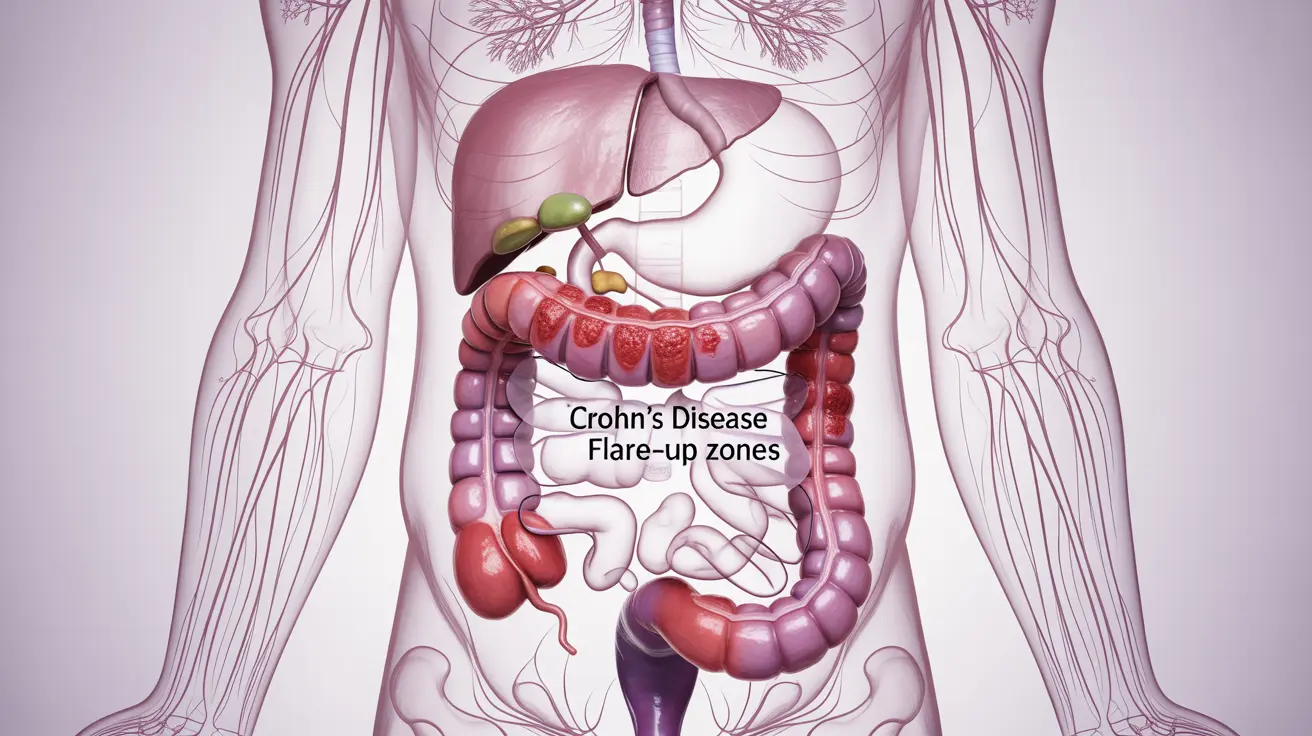Living with Crohn's disease can be challenging, especially when experiencing a flare-up. These periods of active inflammation can significantly impact your quality of life and require prompt attention. Understanding the warning signs and knowing how to respond effectively is crucial for managing this chronic condition.
This comprehensive guide will help you identify Crohn's flare-up symptoms, understand proper management strategies, and know when to seek medical help. We'll explore everything from dietary considerations to emergency warning signs, empowering you to take control of your health.
Recognizing Crohn's Disease Flare-Up Symptoms
When Crohn's disease becomes active, several distinct symptoms may emerge or intensify:
- Severe abdominal pain and cramping
- Persistent diarrhea
- Unexpected weight loss
- Fatigue and weakness
- Blood in stool
- Reduced appetite
- Fever
- Joint pain and swelling
These symptoms can vary in intensity and may develop gradually or appear suddenly. Monitoring and tracking your symptoms can help you identify patterns and communicate more effectively with your healthcare provider.
Dietary Management During Flares
During a Crohn's flare-up, your food choices can significantly impact your comfort and recovery. Some foods to avoid include:
- High-fiber foods
- Raw fruits and vegetables
- Dairy products
- Spicy foods
- Fatty or fried foods
- Caffeinated beverages
- Alcohol
Beneficial Foods During Flares
Focus on these easier-to-digest options:
- Low-fiber, well-cooked vegetables
- Lean proteins like fish or chicken
- White bread and pasta
- Bananas and melons
- Smooth nut butters
- Clear broths and soups
- Rice and potatoes
Emergency Warning Signs
Certain symptoms require immediate medical attention. Seek emergency care if you experience:
- Severe, unrelenting abdominal pain
- High fever (over 101°F)
- Excessive bleeding or blood clots in stool
- Persistent vomiting
- Signs of dehydration
- Inability to keep food or liquids down
- New or worsening symptoms that don't respond to usual treatments
Home Management Strategies
Several approaches can help manage flare-up symptoms at home:
- Follow your prescribed medication schedule strictly
- Use a heating pad for abdominal pain
- Stay hydrated with water and clear fluids
- Get adequate rest
- Practice stress-reduction techniques
- Keep a symptom diary
- Avoid trigger foods
- Take warm baths for comfort
Preventing Future Flares
While not all flares can be prevented, certain strategies may help reduce their frequency:
- Take medications as prescribed
- Maintain regular medical appointments
- Quit smoking if applicable
- Manage stress through relaxation techniques
- Keep a food diary to identify triggers
- Exercise moderately when feeling well
- Get adequate sleep
- Stay up to date with vaccinations
Frequently Asked Questions
What are the main warning signs and symptoms of a Crohn's disease flare-up?
The primary warning signs include severe abdominal pain, persistent diarrhea, blood in stool, unexpected weight loss, fatigue, reduced appetite, and fever. Some patients may also experience joint pain and inflammation.
What foods should I avoid during a Crohn's disease flare-up, and are there certain foods that can help with symptoms?
Avoid high-fiber foods, raw fruits and vegetables, dairy, spicy foods, and fatty foods. Focus on easily digestible foods like well-cooked vegetables, lean proteins, white bread, bananas, and clear broths.
When should I seek emergency medical care for a Crohn's flare, and what are the key warning signs that require urgent attention?
Seek immediate medical attention for severe, unrelenting abdominal pain, high fever, excessive bleeding, persistent vomiting, signs of dehydration, or symptoms that significantly worsen despite treatment.
Are there effective ways to manage or reduce the symptoms of a Crohn's flare-up at home?
Yes, effective home management strategies include following prescribed medications, using heating pads, staying hydrated, getting adequate rest, and practicing stress reduction techniques.
Can stress, medications, or missed doses trigger a Crohn's flare-up, and how can I help prevent future flare-ups?
Yes, all these factors can trigger flares. Prevention strategies include strict medication adherence, stress management, maintaining regular medical check-ups, and identifying and avoiding personal triggers through careful monitoring.




